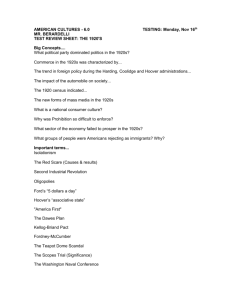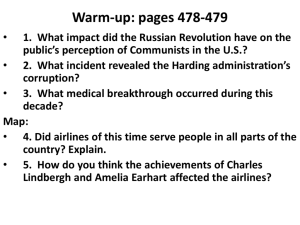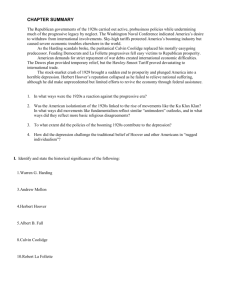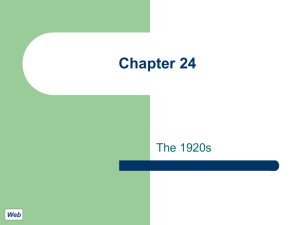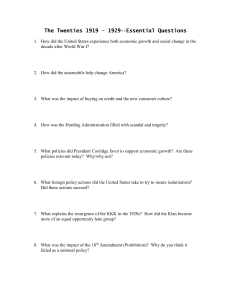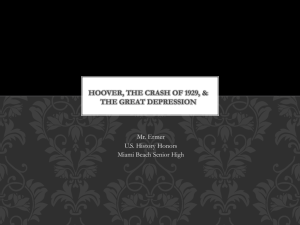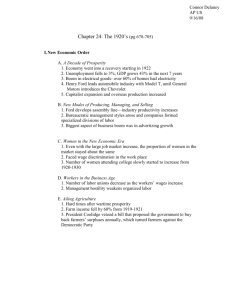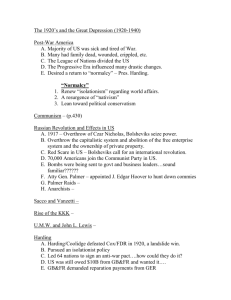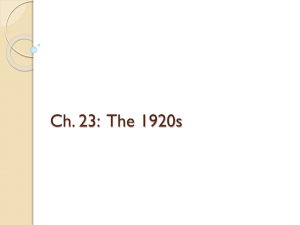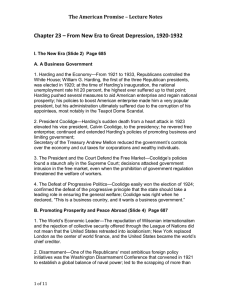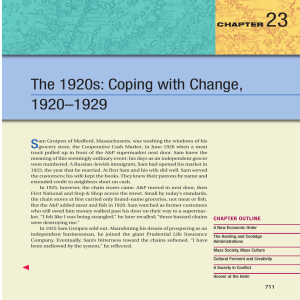Chapter 23: Modern Times: The 1920s
advertisement
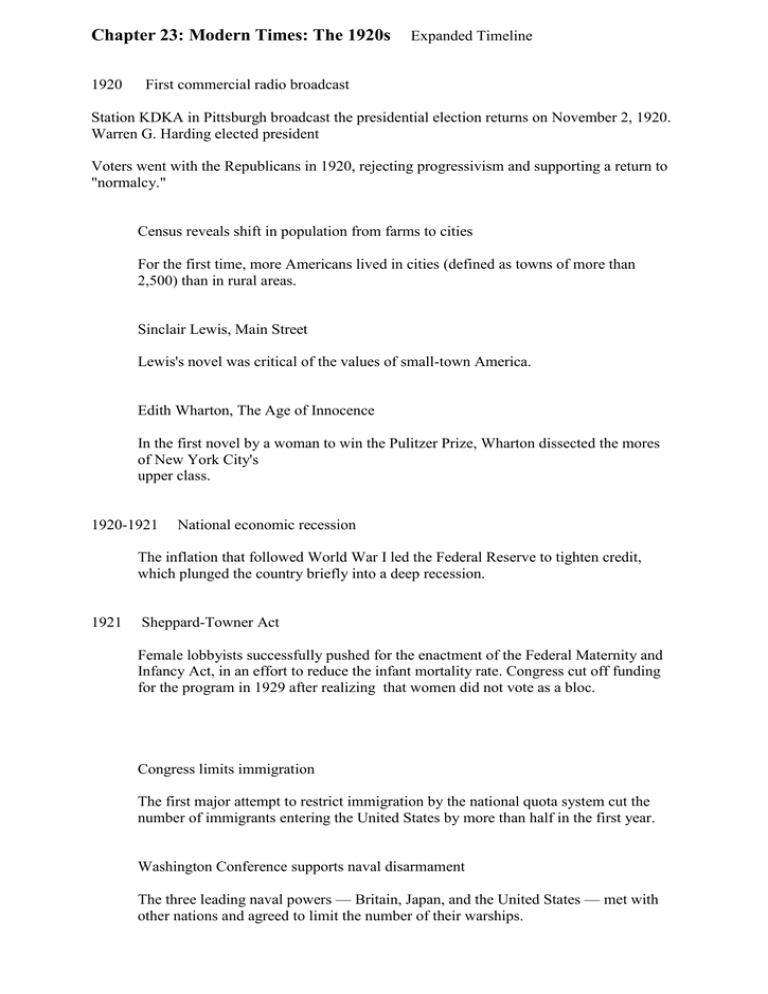
Chapter 23: Modern Times: The 1920s 1920 Expanded Timeline First commercial radio broadcast Station KDKA in Pittsburgh broadcast the presidential election returns on November 2, 1920. Warren G. Harding elected president Voters went with the Republicans in 1920, rejecting progressivism and supporting a return to "normalcy." Census reveals shift in population from farms to cities For the first time, more Americans lived in cities (defined as towns of more than 2,500) than in rural areas. Sinclair Lewis, Main Street Lewis's novel was critical of the values of small-town America. Edith Wharton, The Age of Innocence In the first novel by a woman to win the Pulitzer Prize, Wharton dissected the mores of New York City's upper class. 1920-1921 National economic recession The inflation that followed World War I led the Federal Reserve to tighten credit, which plunged the country briefly into a deep recession. 1921 Sheppard-Towner Act Female lobbyists successfully pushed for the enactment of the Federal Maternity and Infancy Act, in an effort to reduce the infant mortality rate. Congress cut off funding for the program in 1929 after realizing that women did not vote as a bloc. Congress limits immigration The first major attempt to restrict immigration by the national quota system cut the number of immigrants entering the United States by more than half in the first year. Washington Conference supports naval disarmament The three leading naval powers — Britain, Japan, and the United States — met with other nations and agreed to limit the number of their warships. 1922 Fordney-McCumber Tariff The Republicans raised tariffs to keep foreign-made goods out of the country. T. S. Eliot, The Waste Land Eliot's modernist poem spoke, obscurely, about the fragmentation of the postwar world. 1923 Calvin Coolidge succeeds Harding as president The elevation of the upright Coolidge to the presidency convinced the public that the corruption revealed in the Harding administration would be eliminated. Time magazine founded The introduction of a newsweekly in magazine form helped launch a new form of journalism and advertising that would contribute to the development of mass culture. Jean Toomer, Cane This black author's complex, poetic novel of the discovery of his heritage was an inspiration to the writers of the Harlem Renaissance. 1924 Dawes Plan reduces German reparation payments This plan reduced the amount of reparations owed by Germany to the Allies and provided Germany with loans to help the country survive its economic crisis. Bruce Barton, The Man Nobody Knows Barton was an advertising mogul who wrote this book suggesting that Jesus was the greatest businessman the world had ever seen. Teapot Dome scandal Secretary of the Interior Albert Fall was convicted of taking $300,000 in bribes to lease oil reserves on public lands to private companies. U.S. troops withdraw from Dominican Republic As had been the case with Nicaragua and Haiti, the United States had occupied many Caribbean nations, including the Dominican Republic, in pursuit of its national interests. National Origins Act This second stage in immigration restriction further reduced the number of immigrants who could enter the United States from southeastern Europe and Russia. 1925 F. Scott Fitzgerald, The Great Gatsby Fitzgerald's novel laid bare the emptiness of the heedless pursuit of wealth during the 1920s. Height of Ku Klux Klan At its peak, the Klan was able to elect many state and local public officials, particularly in the Midwest. Scopes ("monkey") trial John Scopes was convicted of teaching evolution in his high-school biology class in Dayton, Tennessee. The popular notion of evolution — that humans are descended from apes — gave the trial its nickname. 1926 Alain Locke, The New Negro anthology This collection of poetry, drawings, essays, and stories remains a monument to the work of African American artists of the Harlem Renaissance. 1927 First "talkies" Although changing from silent films to "talkies" seemed prohibitively expensive, the studios quickly recouped their losses as Americans flocked to see the new talking pictures. Charles Lindbergh's solo flight "Lucky Lindy" became the most widely acclaimed hero of American culture in the 1920s when he completed the first solo nonstop flight from New York to Paris. Ford's Model A car Henry Ford finally gave in to competitive pressure from General Motors by introducing the Model A, a car that provided a variety of models and colors for the discriminating consumer. 1928 Herbert Hoover elected president The Republican ticket swept to victory in 1928, having run on the prosperity the Republicans claimed to have brought to the nation in the 1920s. They would, however, soon be blamed for the depression that enveloped the country in the 1930s. Kellogg-Briand Pact signed Sixty-three nations finally signed this treaty agreeing not to pursue war as a way of settling international disputes. The pact reflected a widespread desire for peace, but it established no powers for its enforcement. 1929 Middletown published Sociologists Helen Merrell Lynd and Robert Lynd closely analyzed everyday life in Muncie, Indiana, during the 1920s and produced this classic community study. Ernest Hemingway, A Farewell to Arms This novel about the wastefulness and futility of war made its author, who had served as an ambulance driver in World War I, a renowned figure. William Faulkner, The Sound and the Fury Applying Freudian motifs to the rural South, the author produced one of the major works of American modernism. 1929 Stock market crash On October 29, 1929 ("Black Tuesday") panic selling drove the total value of the stocks on the market from $87 billion down to $55 billion. Agricultural Marketing Act This Hoover administration legislation was the federal government's most aggressive intervention in agricultural stabilization and relief up to that time. 1930 Midwestern drought begins The Great Plains had previously experienced wet and dry cycles. This year, however, a major dry cycle began that, along with a loss of natural vegetation, created a dust bowl that caused thousands of farmers to leave their lands. Hawley-Smoot Tariff This act of economic nationalism raised tariffs to the highest levels ever, which restricted international trade and drove the United States and the rest of the world even deeper into depression. 1931 Scottsboro case The trial of nine black men in Alabama for the alleged rape of two white women created a public protest because of the unfair, harsh sentences and the denial of adequate legal counsel. Hoover declares moratorium on Allied war debts This statesmanlike act eased tension in the international financial arena. Miners strike in Harlan County, Kentucky Coal miners struck over a 10 percent wage cut but were defeated by mine owners and the National Guard. 1932 Reconstruction Finance Corporation (RFC) created President Hoover and Congress hoped to stimulate the economy and create new jobs by funneling federal dollars through this agency into American banks and industry. Acting too cautiously, the RFC failed to achieve this objective. Bonus Army rebuffed by Congress About 15,000 unemployed World War I veterans and their families descended on Washington, D.C., to lobby for immediate payment of their service bonuses. On presidential orders, they were driven out of the city by the U.S. Army, causing a further decline in Hoover's popularity. Height of deportation of Mexican migrant workers The Hoover administration ordered Mexican Americans deported in order to prevent them from becoming a drain on the relief system. But many more Mexicans left the country because they were jobless and local relief agencies refused to help them. Strike at Ford's River Rouge plant in Michigan This strike led to an outbreak of violence between strikers and company security force that left three demonstrators dead and fifty seriously wounded. Communist-led hunger marches American communist activists organized the poor into "unemployment councils" that staged hunger marches in many cities.
